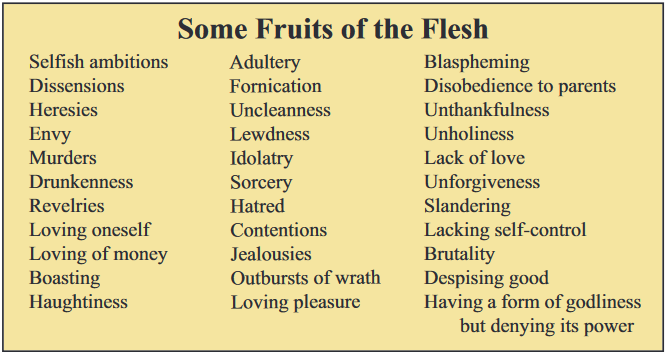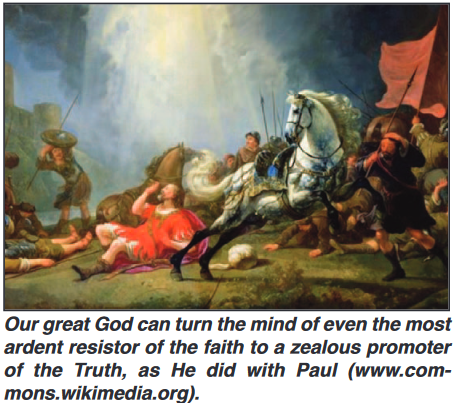
Cast Off the Aimless Traditions of Our Fathers!
It is easy to coast along with our lives without closely examining our routines to see if perhaps there may be some behavior that falls short of perfection. After all, we are admonished by Jesus Christ to achieve perfection: “Therefore you shall be perfect, just as your Father in heaven is perfect” (Matthew 5:48). The word perfect comes from the Greek work teleios, which means “brought to completion, fully accomplished, fully developed,” which comes from telos, “to set out for a definite goal, the point aimed at.”
That goal of perfection, to be just like our Father in heaven in character, is an incredibly awesome goal, one that Jesus, the Son of the Father, did attain, for He was sinless for His entire life despite being tempted just like we are (Hebrews 4:15). We will never achieve such perfection as He did, but we have been washed clean of our sins through repentance, baptism, the laying on of hands, and receiving the holy spirit (Acts 22:16; Revelation 1:5). Those sins have been removed from us as far as the east is from the west (Psalm 103:12), so in that sense we are perfect, and have forgiveness throughout our lives whenever we do err (I John 2:1-2).
We Must Leave Our Past Sins Behind Us!
All through Scripture we are admonished to leave our past errors and pursue life as new creatures. Notice the following Scriptures that reveal to us how the “old man” and its sinful habits must be cast aside in favor of the new creation imparted through the spirit residing within (Acts 2:17; Romans 6:6).
“Therefore gird up the loins of your mind … as obedient children, not conforming yourselves to the former lust, as in your ignorance; but as He who called you is holy, you also be holy in all your conduct, because it is written, ‘Be holy, for I am holy.’ And if you call on the father, who without partiality judges according to each one’s work, conduct yourselves throughout the time of your stay here in fear; knowing that you were not redeemed with corruptible things, like silver or gold, from your aimless [mataios, ‘ineffective, worthless’] conduct [anastrophe, ‘behavior’] received by tradition from your fathers” (I Peter 1:13-18).
“And you He made alive, who were dead in trespasses and sins, in which you once walked according to the course of this world, according to the prince of the power of the air, the spirit who now works in the sons of disobedience, among whom also we all once conducted ourselves in the lusts of our flesh, fulfilling the desires of the flesh and of the mind, and were by nature children of wrath just as the others” (Ephesians 2:1-3).
“For we have spent enough of our past lifetime in doing the will of the gentiles — when we walked in lewdness, lusts, drunkenness, revelries, drinking parties, and abominable idolatries. In regard to these, they think it strange that you do not run with them in the same flood of dissipation, speaking evil of you” (I Peter 4:3-4).
 Many more Scriptures could be cited that tell us to reject the aimless conduct we have inherited from our families, friends, television, iPhones, and our educational system. Ezekiel, during the dark days of Judah’s history, told our forefathers the same things as did Jesus, Peter, and Paul: “Do not walk in the statutes of your fathers, nor observe their judgments, nor defile yourself with their idols …. Walk in My statutes, keep My judgments, and do them …” (Ezekiel 20:18-19).
Many more Scriptures could be cited that tell us to reject the aimless conduct we have inherited from our families, friends, television, iPhones, and our educational system. Ezekiel, during the dark days of Judah’s history, told our forefathers the same things as did Jesus, Peter, and Paul: “Do not walk in the statutes of your fathers, nor observe their judgments, nor defile yourself with their idols …. Walk in My statutes, keep My judgments, and do them …” (Ezekiel 20:18-19).
We are to put off the old man and its destructive habits, and not conform to this present world [kosmos, “the harmonious arrangement or order of things outside of the ecclesia”], for to be a friend of this world is to be an enemy of God (James 4:1-4). This truth is reiterated in John 15:17-19 and 17:14 (since you are not of the world, the world hates you), Romans 12:2 (do not be conformed to the world, but be transformed by the renewing of your mind), I John 2:15-17 (don’t love the world or the things in the world, the lust of the flesh, the lust of the eyes, and the pride of life; see also Genesis 3:1-6), I Thessalonians 4:3-5 (do not partake of gentile lustful passions), Titus 3:3-5 (our past foolishness has been cast off, with its disobedience, lusts, pleasures, envy, and hatred), Galatians 1:4 (Christ will deliver us from this present evil age).
A New Creature
Our vocation is to be new creatures, created in the image of our Creator. Many citations of this truth can be found in Scripture, a few of which are given below.
“Therefore we were buried with Him through baptism into death, that just as Christ was raised from the dead by the glory of the Father, even so we also should walk in newness of life” (Romans 6:4).
“For in Christ Jesus neither circumcision nor uncircumcision avails anything, but a new creation” (Galatians 6:15).
 “Therefore, if anyone is in Christ he is a new creation: old things have passed away; behold, all things have become new. Now all things are of God, who has reconciled us to Himself through Jesus Christ …” (II Corinthians 5:17-18).
“Therefore, if anyone is in Christ he is a new creation: old things have passed away; behold, all things have become new. Now all things are of God, who has reconciled us to Himself through Jesus Christ …” (II Corinthians 5:17-18).
“… that you put off, concerning your former conduct, the old man which grows corrupt according to deceitful lusts, and be renewed in the spirit of your mind, and that you put on the new man which was created according to God, in true righteousness and holiness” (Ephesians 4:22-24).
“Do not lie to one another, since you have put off the old man with his deeds, and have put on the new man who is renewed in knowledge according to the image of Him who created him …” Colossians 3:9-10).
The list of admonitions is long that we must crucify, casting off the old man and putting on the new creation. Some of these past sins that must be crucified in us are given in Galatians 5:19-21 and II Timothy 3:2-5.
We could add to this list even more traits of character that need to be put away, on the road to becoming perfect in God’s eyes. Truly, by casting away ungodliness from us we will stand more and more in stark contrast with those in the world around us, who continue in their assorted evils, wherein “… They think it strange that you do not run with them in the same flood of dissipation, speaking evil of you” (I Peter 4:4).
Breaking Aimless Traditions
 Our habits have been ingrained within us since birth … and even before birth. The field of epigenetics has discovered that behaviors taught to animals can be passed on to the next generation, through changes in the proteins covering the DNA and possibly through other causes. This reality is likely true for humans as well, for as we read in Exodus 20:5, the iniquity of the fathers can be passed down “… to the third and fourth generations of those that hate Me ….” this may be referring to curses in behavior passed down through families: tendencies toward contentions, criminal behavior such as theft and murder, violence, adultery, or holding grudges. Like father, like son; like mother, like daughter. It takes the spirit of God and much work to break through these ingrained generational sins
Our habits have been ingrained within us since birth … and even before birth. The field of epigenetics has discovered that behaviors taught to animals can be passed on to the next generation, through changes in the proteins covering the DNA and possibly through other causes. This reality is likely true for humans as well, for as we read in Exodus 20:5, the iniquity of the fathers can be passed down “… to the third and fourth generations of those that hate Me ….” this may be referring to curses in behavior passed down through families: tendencies toward contentions, criminal behavior such as theft and murder, violence, adultery, or holding grudges. Like father, like son; like mother, like daughter. It takes the spirit of God and much work to break through these ingrained generational sins
Removing Ingrained Habits
Psychologists can tell us of ways to remove ingrained habits from our lives. They can be most useful to complement our quest to cast off aimless traditions … even those that have been inherited from our youth, or even before. We have inherited the sins of our fathers stretching clear back to Adam and Eve (Psalm 51:5: “Surely I was brought forth in iniquity; I was sinful when my mother conceived me”), and it is known that even unborn children experience life in ways we are only beginning to understand. (See T. Verny and J. Kelly, The Secret Life of the Unborn Child, Dell Publishing Company, 1981.)
One list of suggestions from psychologists is as follows (A.Lin and A. Rusciano, Breaking a bad habit in 10 proven steps, Wiki How, www.wikihow.com):
1. Understand why you have the habit. Habits usually exist because the behavior has been rewarded in some way. You reach for sweet treats as a defense against a stressful thought, or become angry to vent off steam when a driver cuts in front of you in traffic. However, many habits — perhaps most — come from emulating the bad habits of parents or family members, friends, or examples seen on television or from others around you.
2. Start small; break smaller habits to increase your motivation. A daunting habit, such as being critical of others, might be attacked by focusing on saying nothing but complimentary things to someone you habitually criticize. Once this becomes easier, expand this tactic to everyone you meet.
3. Swap your bad habit with a goal. Develop a true desire to change your life, and then replace the bad habit, like watching television, with reading or walking.
4. Make a plan. Determine what, when, and how you will break the unwanted habit. Once you understand what triggers the habit and its reward, then you can make plans to swap the habit with healthy and achievable goals, and minimize triggers of the bad habit.
5. Practice mindfulness. Reprogram your thoughts and decrease automatic responses by being mindful of the present moment, rather than let your ideas flow along while repeating the past triggers.
6. Visualize success. Your mind is powerful, and you can imagine yourself performing better habits. Imagine situations in which you would be tempted to repeat the bad habit, and then think of yourself as choosing a better option.
 7. Change your environment. The space around you likely has given you cues to trigger a bad habit, so by rearranging your home, or even moving to another location can be helpful in reducing triggers for the habit. Likely a change in friends may be necessary to remove temptation that has contributed to the problem in the first place.
7. Change your environment. The space around you likely has given you cues to trigger a bad habit, so by rearranging your home, or even moving to another location can be helpful in reducing triggers for the habit. Likely a change in friends may be necessary to remove temptation that has contributed to the problem in the first place.
8. Create barriers to the habit. Make doing the habit so difficult that you begin to loathe the behavior. You might resolve to drop a dollar in a box every time you curse, and then give that money to the homeless.
9. Reward your successes. Habits are created when a behavior is rewarded. By breaking character flaws such as anger or jealousy, the rewards become automatic as one experiences the fruit of more loving and less stressful interpersonal relationships.
10. Be patient. Be kind and gentle to yourself in the process of breaking a habit because behavior conditioning does not happen overnight. But, don’t give up.
God Can Change the Hardest Hearts
Our heavenly Father has given us a program that truly works to remove the aimless traditions of our human fathers. It is a program that the world as a whole cannot understand because it requires a secret ingredient given only to those He has called out of this world: His holy spirit (John 6:44). That spirit codifies within us the fruits of the spirit: love, joy, peace, longsuffering, kindness, goodness, faithfulness, gentleness, and self-control (Galatians 5:22-23). These are traits within us that will utterly demolish the aimless traditions of our elders, that will “break grandad’s bent,” as it were.
Yet, old habits do not give up easily, especially if they have been practiced for a long time. It may take weeks, months, or years — even a lifetime — to root out entrenched character traits that have been a part of us since our youth, and that everyone who knows you expects of you. On the other hand, the change from a bad habit to a good one can happen almost instantaneously.
Take the case of the apostle Paul. He was terribly angry with the ecclesia as it grew by leaps and bounds in Israel.
“Then Saul, still breathing threats and murder against the disciples of the Lord, went to the high priest and asked letters from him to the synagogues of Damascus, so that if he found any who were of the Way, whether men or women, he might bring them bound to Jerusalem” (Acts 9:1-2).
Not long after, he was struck down and blinded by Jesus on the road to Damascus, and was led to the house of Judas. After fasting three days, Ananias was sent to Judas’ house, where Paul’s eyesight was restored, and he was baptized. Thereafter Paul became the stalwart, unflinching champion of the Truth, and preached the gospel message and salvation to countless individuals throughout many nations for the rest of his life. HE WAS A CHANGED MAN THROUGH THE HOLY SPIRIT! Thereafter, he preached the way of love, joy, peace, kindness, and humility as stated earlier, and to the Romans, for example, he wrote:
“Let love be without hyposcrisy. Abhor what is evil. Cling to what is good. Be kindly affectionate to one another with brotherly love, in honor giving preference to one another; not lagging in diligence, fervent in spirit, serving the Lord; rejoicing in hope, patient in tribulation, continuing steadfastly in prayer; distributing to the needs of the saints, given to hospitality. Bless those who persecute you; bless, and do not curse” (Romans 12:9-14).
Notice how Paul interacted with the brethren at Miletus when he was about to leave on his trek back to Jerusalem.
 “And when he had said these things, he knelt down and prayed with them all. Then they all wept freely, and fell on Paul’s neck and kissed him, sorrowing most of all for the words which he spoke, that they would see his face no more. and they accompanied him to the ship” (Acts 20:36-38).
“And when he had said these things, he knelt down and prayed with them all. Then they all wept freely, and fell on Paul’s neck and kissed him, sorrowing most of all for the words which he spoke, that they would see his face no more. and they accompanied him to the ship” (Acts 20:36-38).
What a change from his previous self! Paul made a complete turnaround from a hot-headed, brutal, unforgiving persecutor of the elect to a gentle, kind, forgiving, loving, patient champion of God’s way of life. We can probably think of others we have known who have likewise suddenly changed, or perhaps gradually over months or years. I can testify concerning myself. As a younger person I was prone to anger and impatience, but God has led me to see myself in all of my ugly self-centeredness, and changed me through many humbling experiences in life. The changes did not occur instantaneously as they did for Paul, but occur they did! They were not easy, but God worked in His marvelous ways to change my life to more perfectly emulate Himself.
What God Instructs Us to Do
Our heavenly Father in His endless love for us uses several methods to move us towards His righteous character, to alienate us from the aimless traditions of our fathers. Here are a few of those methods.
1. He causes us to suffer. Suffering in the flesh moves us away from sinning in any form.
“Therefore, since Christ suffered [pascho, ‘suffer a painful sensation’] for us in the flesh, arm yourselves also with the same mind, for he who has suffered in the flesh has ceased from sin, that he no longer should live the rest of his time in the flesh for the lusts of men, but for the will of God” (I Peter 4:1-2).
 This suffering is essential, to experience the sufferings that Christ did, and thus walk in His footsteps (I Peter 2:21; 3:18; Philippians 1:29), for He will do everything in His power to support you to the end (Philippians 1:6). The result of this suffering is so clearly stated in I Peter 5:10:
This suffering is essential, to experience the sufferings that Christ did, and thus walk in His footsteps (I Peter 2:21; 3:18; Philippians 1:29), for He will do everything in His power to support you to the end (Philippians 1:6). The result of this suffering is so clearly stated in I Peter 5:10:
“But may the God of all grace, who called us to His eternal glory by Christ Jesus, after you have suffered [pascho] a while, perfect, establish, strengthen, and settle you.”
We are children of God and joint heirs with Christ “… if we indeed suffer [pascho] with Him, that we may also be glorified together” (Romans 8:17). Paul then goes on in Romans 8:18-23 to explain how the entire creation groans together in anticipation of the coming release from the pain of this age, as we are “… eagerly waiting for the adoption, the redemption of our body” (verse 23). Peter emphasizes that such suffering is to be expected for us in this life, and should be a source of great joy (I Peter 4:12-13), and Paul adds that such suffering is not even worthy of being compared with the glory that will be revealed in us as spirit beings (Romans 8:18).
2. He pleads with us to do His will. Doing the will of God directly implies that we conform our habits to His way of thinking, casting off erroneous traits that conflict with His will. This involves a conscious effort on our part, whether in the midst of suffering or not. We emulate Jesus Christ in His quest to carry out the Father’s will while He lived here on earth (John 5:19; 6:38).
This is the message given from the very beginning of this eon: “Of every tree of the garden you may freely eat; but of the tree of the knowledge of good and evil you shall not eat of it …” (Genesis 2:16-17). It was the same contract that the Eternal gave to ancient Israel in order that they might reap untold blessings (Leviticus 26:1-13; Deuteronomy 28:1-14).
There are countless admonitions throughout the Scriptures that we are to do God’s will.
“For whoever does the will of God is My brother and My sister and mother” (Mark 3:35).
“… not with eyeservice, as manpleasers, but as bondservants of Christ, doing the will of God from the heart …” (Ephesians 6:6).
“Sacrifice and offering You did not desire; My ears You have opened. Burnt offering and sin offering You did not require. Then I said, ‘Behold, I come; in the scroll of the book it is written of me. I will delight to do Your will, O my god, and Your law is within my heart’” (Psalm 40:6-8).
“For you have need of endurance, so that after you have done the will of God, you may receive the promise …” (Hebrews 10:36).
“… because Abraham obeyed My voice and kept My charge, My commandments, My statutes, and My laws” (Genesis 26:5).
“Behold, I set before you today a blessing and a curse: the blessing if you obey the commandments of the Lord your God which I command you today …” (Deuteronomy 11:26-27).
“Now therefore, if you will indeed obey My voice and keep my covenant, then you shall be a special treasure to Me above all people; for all the earth is Mine. And you shall be to Me a kingdom of priests and a holy nation” (Exodus 19:5-6).
By consciously seeking to fulfill the will of God — His laws, commandments, statutes, and judgments — worthless habits inherited from our past will be replaced with upright behavior This change may not occur overnight, however.
3. He commands us to love one another. This method of changing our habits is actually a part of point 2 above, but is so very important that it deserves its own attention. We as God’s people are to be identified by the love we have for one another (John 13:34-35), a love that transcends everything else in our lives. Song of Solomon 8:6 states that “… love is as strong as death …,” and it is the very epitome of God’s commandments (I John 5:3). It is exemplified by Jesus washing the disciples’ feet the night He was betrayed, placing Himself on a plane below them — even below Judas, His betrayer — to make clear that true agape love requires deep humility and setting oneself even below one’s brother (John 13:12-16; Philippians 2:1-5). By doing to others as you would like others to do to yourself you are performing selfless acts of love that erase any traces of self-centered pride and authoritarianism, those lustful traits which fight against the habits that the Eternal is striving to place within us.
4. He asks that we search out our secret sins, and then annihilate and replace them with righteous thoughts, words, and deeds.
“Who can understand his errors? Cleanse me from secret faults” (Psalm 19:12).
secret = cathar, “to hide by covering, shelter.”
King David acknowledged that he had sins which the Eternal saw, but he did not (Psalm 90:8), and he asked God to cancel them (Psalm 51:9-10). We ought to ask God to reveal these hidden sins so we can replace them with new habits that are pure. Only by facing squarely our error can we become perfect, even as our Father in heaven is perfect (Matthew 5:48). Ultimately we must rely upon the Father to cover our sins by His atoning [kaphar, “to cover”] blood sacrifice, but that must not be an excuse for us to avoid rooting out sin in our lives. Once exposed, the sin should be a stench in our spiritual nostrils, and we should work to remove such sins altogether.
The Conclusion
We must never give up in our efforts to cast off the aimless traditions of our fathers. The fight to remove them may take time, even a lifetime, but the fruits of leaving them behind and replacing them with righteousness are abundant and sweet.
We are admonished to gain the perfection of character that will assure us a place in the heavenly kingdom of God. By experiencing suffering, doing the Father’s will, loving our God and our neighbor, and asking Him to reveal to us our secret sins, we can grow closer and closer to the perfection our Creator has set before us. Though we will never attain total perfection, we can strive after it with wisdom and patience. As the apostle Paul stated in I Corinthians 9:24, “Run [the race] in such a way that you may obtain it.” Then in Hebrews 12:1 he said,
“… let us lay aside every weight, and the sin which so easily ensnares us, and let us run with endurance the race which is set before us.”
Paul is asking us to run the race with great patience, much like in a marathon runner, forgetting the things that are behind and reaching forwards towards things that are ahead. He said, “I press [kioko, “pursue”] toward the goal for the prize of the upward call of God in Christ Jesus” (Philippians 3:14). Those that are mature, or perfect [teleios], must have this mind (Philippians 3:15).
Casting off entrenched traditions and habits is not easy, but we can be victors in this quest. For, it is those who endure in this quest to the end who will be saved!

